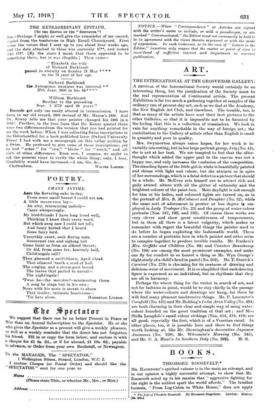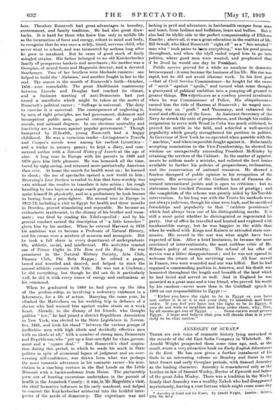BOOKS.
THEODORE ROOSEVELT.*
MR. HAGEDOSN'S spirited volume is in the main an attempt, and in our opinion a highly successful attempt, to show that Mr. Roosevelt acted up to his maxim that "aggressive fighting for the right is the noblest sport the world afforde." The familial formula, "From Log-Cabin to White House," does not apply • The Woof Theodora Rooe.reit. By Herm= naiadorn. Landau: liarrep. 1(111. natl.
here. Theodore Roosevelt had great advantages in heredity, environment, and family tradition.. He had also great draw- backs. It is hard for those who knew him only in middle life as the incarnation of force and energy, robust in mind and body, to recognize that he was once a sickly, timid, nervous child, who never went to school, and was tormented by asthma long after he grew to manhood. But he came of good stock of finely mingled strains. His father belonged to an old Knickerbocker family of prosperous bankers and merchants ; his mother was a Georgian, of mixed Scots and Huguenlit descent, and a devoted Southerner. Two of her brothers were blockade-runners; one helped to build the ' Alabama,' and another fought in her to the end. The omens in the month of Roosevelt's birth—October, I858—were remarkable. The great Abolitionist controversy between Lincoln and Douglas had reached its climax, and a fusionist meeting of anti-Democrats had just issued a manifesto which might be taken as the motto of Roosevelt's political career : 'Suffrage is universal. The duty to exercise it is universal. The consequences of neglecting it, by men of right principles, are bad government, dishonest and incompetent public men, general corruption of the public morals, and national disgrace. In our elections neutrality and inactivity are a treason against popular government." Though hampered by ill-health, young Roosevelt had a happy childhood. He was a voracious reader—Livingstone's Travels and Cooper's novels were among his earliest favourites— and a leader in nursery games; he kept a diary, and com- menced author with a Natural History of Insects at the age of nine. A long tour in Europe with his parents in 1869 and 1870 gave him little pleasure. He was homesick all the time, bored by sight-seeing, and returned more patriotically American than ever. At home the search for health went on ; he learned to shoot ; the use of spectacles opened a new world to him ; Browning's Last Duchess revealed to him that hero-worship was vain without the resolve to translate it into action ; his rough handling by two boys on a stage-coach prompted the decision to make himself fit physically, and as a preliminary he took lessons in boxing from a prize-fighter. His second tour in Europe in 1872-73, including a visit to Egypt for health and three months in Dresden, proved stimulating and enjoyable. He became an enthusiastic taxidermist, to the dismay of his brother and room- mate ; was fired by reading the Nibelungenlied; and by his general conduct earned the description of "a little berserker" given him by his mother. When he entered Harvard in 1876 his ambition was to become a Professor of Natural History, and his rooms were a mixture of museum and menagerie. But he took a full share in every department of undergraduate life, athletic, social, and intellectual. His activities remind one of Prince Giglio in The Bose and the Bing. He was prominent in the Natural History Society, Arts Club, Finance Club, Phi Beta Kappa ; he edited a paper, boxed and wrestled and danced, and helped to start the annual athletic contests with Yale. He was not a Crichton; he did everything, but though he did not do it particularly well, he did it with every ounce of energy and enthusiasm at his command.
When he graduated in 1880 he had given up the idea of the professorship, as involving a sedentary existence in a laboratory, for a life of action. Marrying the same year, he climbed the Matterhorn on his wedding trip in defiance of a doctor who had warned him against undue strain on a weak heart. Already, to the dismay of his friends, who thought politics "low," he had joined a district Republican Association in New York, was elected to the State Legislature in Novem- ber, 1881, and took his stand "between the various groups of ineffective men with high ideals and decidedly effective men with no ideals at all," with a number of strong men, Democrats and Republicans, who "put up a first-rate fight for clean govern- ment and a 'square deal,'" But Roosevelt's chief inspira- tion during this period, in which he made his mark in State politics in spite of occasional lapses of judgment and an over- weening self-confidence, was drawn from what was perhaps the most romantic adventure in his romantic career—his asso- ciation in a ranching venture in the Bad Lands on the Little Missouri with a backwoodsman from Maine. The partnership grew out of hunting excursions undertaken in the pursuit of health in the Aroostook County : it was, in Mr. Hagedorn's view, the chief formative influence in his early manhood, and helped to convert the Knickerbocker aristocrat into the faithful inter- preter of the needs of democracy. The experience was not
lacking in peril and adventure, in hairbreadth escapes from man and beast, from Indiana and buffaloes, bears and bullies. But it also had its idyllic side in the perfect companionship of Elkhorn Ranche ; above all, it was a great edueation in the realities of life. Bill Sewall, who liked Roosevelt "right off" as a " fair-minded " man who "took pains to horn everything," was his good genius throughout, and when the idyll ended urged him to go into polities, where good men were wanted, and prophesied that if he lived he would one day be President.
Public service proved for a while an anodyne to domestic bereavement : it soon became the business of his life. His nab was rapid, but he did not avoid irksome work. In his first post —that of Civil Service Commissioner—he fought for the cause of " merit " against "spoils," and turned what some thought a graveyard of political ambition into a jumping-off ground to greater things. Ills experiaaces as a cowboy proved invaluable when he was Commissioner of Police. His ubiquitousness earned him the title of Haroun al Roosevelt ; he waged unre- lenting war on " graft " and Tammany, and enhanced the moral and efficiency of the force. As Assistant-Secretary of the Navy he struck the note of preparedness, and though his sudden resignation to serve with Wood in Cuba was much criticized, he proved his mettle. in the field, and achiSed a well-merited popularity which greatly strengthened his position in polities. As Governor of New York he co-operated when possible with the "machine," and when impossible fought against it. Reluctantly accepting nomination to the Vice-Presidentship, he showed his wisdom on unexpectedly succeeding President McKinley by retaining the services of the Cabinet. In the matter of appoint- ments he seldom made a mistake, and enlisted the best brains available to further his policies of preparedness, reclamation. and the conservation of national resources. He showed a fearless disregard of public opinion in his recognition of the negroes. His severance of the Gordian knot of Panama dis- tressed international jurists and is open to criticism : but no statesman has touched Panama without loss of prestige ; and the completion of the scheme was greatly aided by hief oreible intervention. In his long war with the Trusts his methods were not always judicious, though his aims were high, and he sacrificed friendships and popularity to that "ruthless persistence" which had always been one of his distinguishing marks. It is still a moot point whether he disintegrated or regenerated his party. Out of office he travelled and hunted and explored with inexhaustible energy, but he was happier in the wilds than when he walked with Kings and Kaisers or attended state cere- monies. His record in the war was what might have been expected of him. After a brief hesitation, he became the most convinced of interventionists, the most ruthless critic of Mr. Wilson's policy of neutrality. The refusal of his offer of service was a bitter disappointment ; and he was not spared to welcome the return of his surviving sons. All four served in France, two were wounded and one was killed. But he had regained a commanding position in America, and his death was lamented throughout the length and breadth of the land which he had loved and served so well. And in England he was mourned as a great man and a true friend, who proved his worth by his candour—never more than in the Guildhall speech in 1909 on our responsibilities to Egypt :— " Either you have the right to be in Egypt or you have not, either it is or it is not your duty to establish and keep order. If you feel you have not the right to be in Egypt, if you do not wish to establish and keep order there, why, then, by all means get out of Egypt. . . . Some nation must govern Egypt. I hope and believe that you will decide that it is your duty to be that nation."



































 Previous page
Previous page